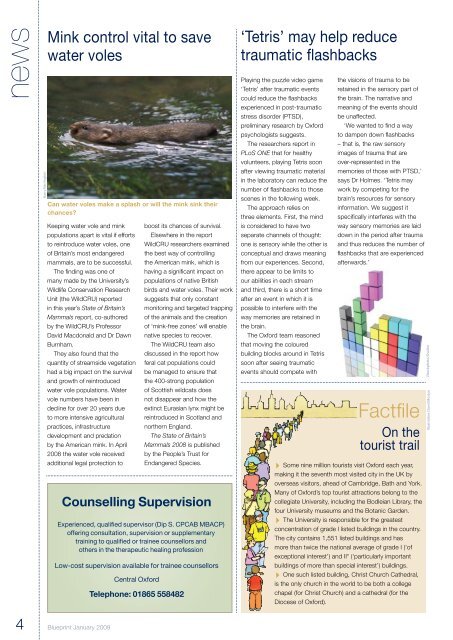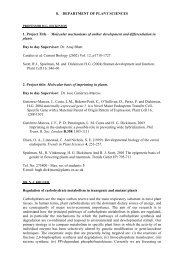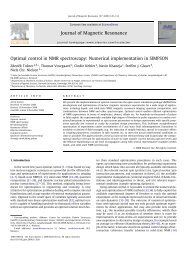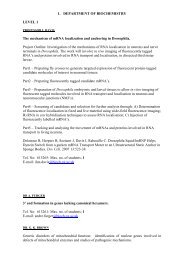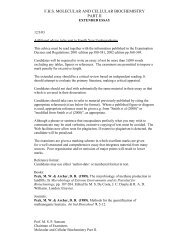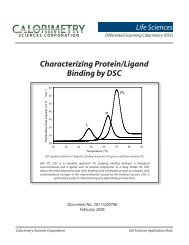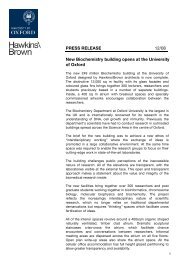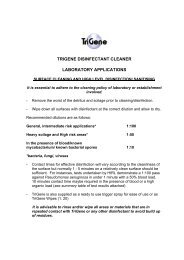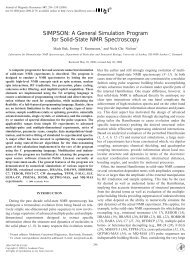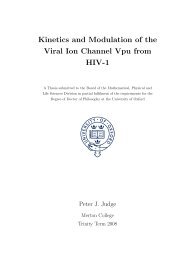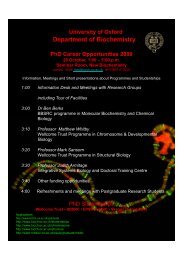Beautiful Biochemistry Educating the workers - Department of ...
Beautiful Biochemistry Educating the workers - Department of ...
Beautiful Biochemistry Educating the workers - Department of ...
Create successful ePaper yourself
Turn your PDF publications into a flip-book with our unique Google optimized e-Paper software.
news<br />
4<br />
Harry Harrington<br />
Mink control vital to save<br />
water voles<br />
Can water voles make a splash or will <strong>the</strong> mink sink <strong>the</strong>ir<br />
chances?<br />
Keeping water vole and mink<br />
populations apart is vital if efforts<br />
to reintroduce water voles, one<br />
<strong>of</strong> Britain’s most endangered<br />
mammals, are to be successful.<br />
The finding was one <strong>of</strong><br />
many made by <strong>the</strong> University’s<br />
Wildlife Conservation Research<br />
Unit (<strong>the</strong> WildCRU) reported<br />
in this year’s State <strong>of</strong> Britain’s<br />
Mammals report, co-authored<br />
by <strong>the</strong> WildCRU’s Pr<strong>of</strong>essor<br />
David Macdonald and Dr Dawn<br />
Burnham.<br />
They also found that <strong>the</strong><br />
quantity <strong>of</strong> streamside vegetation<br />
had a big impact on <strong>the</strong> survival<br />
and growth <strong>of</strong> reintroduced<br />
water vole populations. Water<br />
vole numbers have been in<br />
decline for over 20 years due<br />
to more intensive agricultural<br />
practices, infrastructure<br />
development and predation<br />
by <strong>the</strong> American mink. In April<br />
2008 <strong>the</strong> water vole received<br />
additional legal protection to<br />
Counselling Supervision<br />
Experienced, qualified supervisor (Dip S. CPCAB MBACP)<br />
<strong>of</strong>fering consultation, supervision or supplementary<br />
training to qualified or trainee counsellors and<br />
o<strong>the</strong>rs in <strong>the</strong> <strong>the</strong>rapeutic healing pr<strong>of</strong>ession<br />
Low-cost supervision available for trainee counsellors<br />
Blueprint January 2009<br />
Central Oxford<br />
Telephone: 01865 558482<br />
boost its chances <strong>of</strong> survival.<br />
Elsewhere in <strong>the</strong> report<br />
WildCRU researchers examined<br />
<strong>the</strong> best way <strong>of</strong> controlling<br />
<strong>the</strong> American mink, which is<br />
having a significant impact on<br />
populations <strong>of</strong> native British<br />
birds and water voles. Their work<br />
suggests that only constant<br />
monitoring and targeted trapping<br />
<strong>of</strong> <strong>the</strong> animals and <strong>the</strong> creation<br />
<strong>of</strong> ‘mink-free zones’ will enable<br />
native species to recover.<br />
The WildCRU team also<br />
discussed in <strong>the</strong> report how<br />
feral cat populations could<br />
be managed to ensure that<br />
<strong>the</strong> 400-strong population<br />
<strong>of</strong> Scottish wildcats does<br />
not disappear and how <strong>the</strong><br />
extinct Eurasian lynx might be<br />
reintroduced in Scotland and<br />
nor<strong>the</strong>rn England.<br />
The State <strong>of</strong> Britain’s<br />
Mammals 2008 is published<br />
by <strong>the</strong> People’s Trust for<br />
Endangered Species.<br />
‘Tetris’ may help reduce<br />
traumatic flashbacks<br />
Playing <strong>the</strong> puzzle video game<br />
‘Tetris’ after traumatic events<br />
could reduce <strong>the</strong> flashbacks<br />
experienced in post-traumatic<br />
stress disorder (PTSD),<br />
preliminary research by Oxford<br />
psychologists suggests.<br />
The researchers report in<br />
PLoS ONE that for healthy<br />
volunteers, playing Tetris soon<br />
after viewing traumatic material<br />
in <strong>the</strong> laboratory can reduce <strong>the</strong><br />
number <strong>of</strong> flashbacks to those<br />
scenes in <strong>the</strong> following week.<br />
The approach relies on<br />
three elements. First, <strong>the</strong> mind<br />
is considered to have two<br />
separate channels <strong>of</strong> thought:<br />
one is sensory while <strong>the</strong> o<strong>the</strong>r is<br />
conceptual and draws meaning<br />
from our experiences. Second,<br />
<strong>the</strong>re appear to be limits to<br />
our abilities in each stream<br />
and third, <strong>the</strong>re is a short time<br />
after an event in which it is<br />
possible to interfere with <strong>the</strong><br />
way memories are retained in<br />
<strong>the</strong> brain.<br />
The Oxford team reasoned<br />
that moving <strong>the</strong> coloured<br />
building blocks around in Tetris<br />
soon after seeing traumatic<br />
events should compete with<br />
<strong>the</strong> visions <strong>of</strong> trauma to be<br />
retained in <strong>the</strong> sensory part <strong>of</strong><br />
<strong>the</strong> brain. The narrative and<br />
meaning <strong>of</strong> <strong>the</strong> events should<br />
be unaffected.<br />
‘We wanted to find a way<br />
to dampen down flashbacks<br />
– that is, <strong>the</strong> raw sensory<br />
images <strong>of</strong> trauma that are<br />
over-represented in <strong>the</strong><br />
memories <strong>of</strong> those with PTSD,’<br />
says Dr Holmes. ‘Tetris may<br />
work by competing for <strong>the</strong><br />
brain’s resources for sensory<br />
information. We suggest it<br />
specifically interferes with <strong>the</strong><br />
way sensory memories are laid<br />
down in <strong>the</strong> period after trauma<br />
and thus reduces <strong>the</strong> number <strong>of</strong><br />
flashbacks that are experienced<br />
afterwards.’<br />
Factfile<br />
On <strong>the</strong><br />
tourist trail<br />
▸▸Some nine million tourists visit Oxford each year,<br />
making it <strong>the</strong> seventh most visited city in <strong>the</strong> UK by<br />
overseas visitors, ahead <strong>of</strong> Cambridge, Bath and York.<br />
Many <strong>of</strong> Oxford’s top tourist attractions belong to <strong>the</strong><br />
collegiate University, including <strong>the</strong> Bodleian Library, <strong>the</strong><br />
four University museums and <strong>the</strong> Botanic Garden.<br />
▸▸The University is responsible for <strong>the</strong> greatest<br />
concentration <strong>of</strong> grade I listed buildings in <strong>the</strong> country.<br />
The city contains 1,551 listed buildings and has<br />
more than twice <strong>the</strong> national average <strong>of</strong> grade I (‘<strong>of</strong><br />
exceptional interest’) and II* (‘particularly important<br />
buildings <strong>of</strong> more than special interest’) buildings.<br />
▸▸One such listed building, Christ Church Ca<strong>the</strong>dral,<br />
is <strong>the</strong> only church in <strong>the</strong> world to be both a college<br />
chapel (for Christ Church) and a ca<strong>the</strong>dral (for <strong>the</strong><br />
Diocese <strong>of</strong> Oxford).<br />
Illustration: David Mostyn iStockphoto/Osuleo


